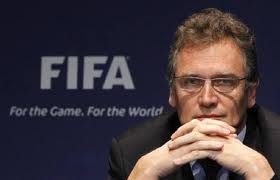By Andrew Warshaw
April 28 – FIFA secretary general Jerome Valcke has endorsed the ongoing probe being conducted by the organisation’s ethics investigator Michael Garcia into the voting process for the 2018 and 2022 World Cups.
Following the award of both tournaments to Russia and Qatar, respectively, allegations of impropriety and violating FIFA’s code of ethics have swirled around. Only 22 of the 24 members of FIFA’s executive committee ended up voting after two were suspended.
Last month, this website reported that FIFA had side-stepped a potential new storm after it emerged that tentative moves were taken by senior figures to try and shut down the corruption-busting inquiry.
Garcia is due to report back to FIFA later this year and Valcke says FIFA’s image would be badly tarnished if the former US attorney is prevented from completing his work.
“Michael Garcia is doing the job which is defined under the ethics code,” said Valcke. “It would be a terrible picture and terrible thing to remove Michael Garcia.”
Valcke ideally would like Garcia’s report to be submitted before the start of this summer’s World Cup in Brazil. It “should come now, we should have a final, final position and the best would be even before the World Cup 2014 and then just work on the next World Cup,” he told reporters in Rio de Janeiro during his latest inspection visit.
“We are working on the organisation of 2018 from now, as we are working with Qatar since the first day they received the organisation of the World Cup,” Valcke said. “We need to be able to work in an environment which is, let’s say, a safe one.”
Meanwhile Valcke has downplayed violent scenes in the favelas of Rio that have been flashed around the world.
“It is a tragic episode which causes sadness, but it is not sufficient to say the Cup is at risk,” Valcke told AFP. “I have received several messages asking me if there is a civil war in Brazil, and I have replied no.”
Rio’s Maracana is scheduled to host seven matches during the World Cup, including the final on July 13. At the end of his four-day inspection, Valcke tried to be as upbeat as he could despite seven years of delays and security risks.
“I feel happy we are close to the World Cup – and finally we will be talking about football,” he said. Brazilian sports minister Aldo Rebelo added: “We’re at the stage where everybody – national and state governments, city councils and the LOC – has to pull together to overcome the last remaining obstacles.
“There is still work to be done in some stadiums and a number of construction projects to be finished. But with hard work everything will be in place for the opening Game at the Arena de Sao Paulo and for the competition as a whole. We are fulfilling the task that we were set, which is to organise the unforgettable festival of football that the whole world is expecting.”
At the weekend, a Brazilian second division match between Luverdense and Vasco da Gama served as a test event for another troublesome stadium, the Arena Pantanal in Cuiaba.
Speaking afterwards, organising committee stadium operations manager Tiago Paes was cautiously optimistic. “The fact of the matter is that not everything worked perfectly, though it should be said that we didn’t expect everything to go 100% to plan because this is only the arena’s second game and the first LOC test event here,” he said. “We know we need to improve and we’ll be doing that step by step.”
Contact the writer of this story at moc.l1745207460labto1745207460ofdlr1745207460owedi1745207460sni@w1745207460ahsra1745207460w.wer1745207460dna1745207460

